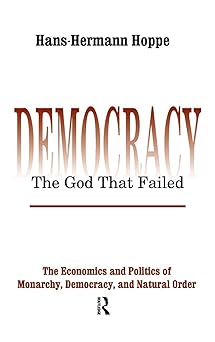
Last month, I looked at Matt Zwolinski's essay, titled Libertarianism's Democracy Problem. In it he referred to this book by Hans-Hermann Hoppe (H3 from here on). And also Against Democracy by Jason Brennan, which I read and liked quite a bit.
But I was intrigued enough to request H3's book, which arrived from Brandeis U, thanks to the Interlibrary Loan Service of the University Near Here. (The inner cover says the book was purchased for the Brandeis library by the "Brandeis National Women's Committee", which strikes me as an odd choice for a Women's Committee, but never mind.)
Anyway: I didn't care for the book much. It's not really about democracy, but a manifesto detailing and advocating H3's political philosophy. Which his subtitle calls "natural order", but most of us fellow travellers of the libertarian camp know as anarchocapitalism: all property is private, its justice system (police, justice, punishment) provided by firms competing for voluntary customers in the marketplace.
H3's inspiration is in the Austrian school of economics, particularly Ludwig von Mises and Murray Rothbard. Those two are quoted and praised extensively, with the fervor of a old-style bible-thumper quoting the Good Book. The (equally Austrian) Friedrich Hayek is relatively ignored, relegated to some footnotes. (H3's excuse: Hayek studied under early Mises, before the Misesian system was entirely worked out, and hence is a heretic. Rothbard got Mises later, and therefore is his true intellectual heir.)
H3's political/economic views are heterodox. For example, he likes old-style monarchy better than democracy, because the monarch "owns" the state, and is constrained in his behavior as is any business owner: his ability to please the customers. Democratic governments, on the other hand, are all on a slippery slope eventually, inevitably, leading to socialist totalitarianism; it's just that some countries got there quicker than others.
As for America: the Declaration was great, the resulting Revolution was inspiring, the post-Revolutionary government was admirable, and the Constitution was a big fat mistake, giving too much power to the Federal Government. Arguable!
Even more arguable is H3's sympathy for the secessionist "Southern Confederacy" decades later; after all, weren't they just insisting on doing the same thing America did when it seceded from Britain? (H3 admits, finally, that "the issue of slavery" might have "complicated and obscured the situation in 1861." Gee, ya think?
Along the way H3 disdains liberal pieties, for example multiculturalism. He claims "no multicultural society—and especially no democratic one—has ever worked peacefully for very long." Uh, Hans, simply as an editing pedantry: if no such society exists, then the aside about democratic ones is superfluous at best.
H3 can also be hair-on-fire apocalyptic: "The U.S. government does not protect us. To the contrary, there exists no greater danger to our life, property, and prosperity than the U.S. government, and the U.S. president in particular is the world's single most threatening and armed danger, capable of ruining everyone who opposes him and destroying the entire globe."
The book is ©2001, by the way. U.S. Presidents have just been "biden" their time in destroying the globe.
Bottom line: even as a mostly-libertarian, I can't recommend H3. He's right about some things, utterly wrong about way too many others. If you want a libertarian critique of democracy, Jason Brennan's a better choice.
![[Amazon Link]](/ps/asin_imgs/1930865856.jpg)
![[The Blogger]](/ps/images/barred.jpg)



